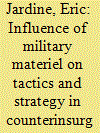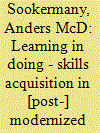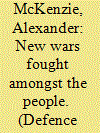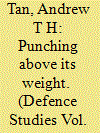|
|
|
Sort Order |
|
|
|
Items / Page
|
|
|
|
|
|
|
| Srl | Item |
| 1 |
ID:
110080


|
|
|
|
|
| Publication |
2011.
|
| Summary/Abstract |
This paper presents an analysis of the multiple effects of greater military materiel and troop quantities on the conduct of counterinsurgency. Although counterinsurgency is often considered a manpower intensive form of warfare, this paper posits that several dangers are inherent in the provision of more troops to the waging of such campaigns. Using the British counterinsurgency in Malaya as an illustrative, inductive case study, this article argues that greater materiel strength distorts the counterinsurgency's tactical and operational efforts, which can then dislocate their strategic plans.
|
|
|
|
|
|
|
|
|
|
|
|
|
|
|
|
| 2 |
ID:
110083


|
|
|
|
|
| Publication |
2011.
|
| Summary/Abstract |
The modern Olympic Games are large and complex enough to be termed 'mega events'. They use enormous resources; human, physical and financial. The effects of such investments are significant and long-lived for the host country; both urban infrastructure and security measures must be meticulously planned to ensure the event's success. In the case of London 2012, there was less than 24 hours between the announcement that London would be the host, and the tragic events of the July bombings, meaning that Britain's Olympic Games would forever be inextricably linked with terrorism. This paper examines whether the forthcoming Olympic Games has been used as an opportunity to ensure that Britain's maritime flank is as well protected as it can be. It will ask whether there is a credible threat to the UK from the maritime domain, both during the event, and once it has finished. It will look at how the Government views the issue of defence of our homeland waters from threats, what work has been done to mitigate risks to the Olympics, and whether, once the closing ceremony has finished, the unique opportunities offered by the hosting of such event has made us safer. It will conclude that there is a credible threat of attack on the UK's way of life, either at, or from the sea, but despite this, the Government is taking a strategic risk in relying on the maritime environment to deliver over 90 per cent of our trade. Not only that, the Government has directed that security for the Olympics will be based on 'business as usual', and so the hosting of the largest event on the planet has potentially been a missed opportunity to focus on strengthening our security structures. Current Government Foreign and Defence Policies provide little opportunity for re-visiting our homeland security strategy, despite predictions of security requirements to preserve our way of life becoming future defence priorities. In this era of fiscal strain, ever fewer assets and capabilities, and our reliance on the sea for our very survival, the homeland maritime domain has never looked so vulnerable.
|
|
|
|
|
|
|
|
|
|
|
|
|
|
|
|
| 3 |
ID:
110078


|
|
|
|
|
| Publication |
2011.
|
| Summary/Abstract |
The 'mentoring' of the Afghan armed forces will increasingly feature in the Coalition agenda as its involvement in Afghanistan gradually shifts to an 'indirect approach' by 2015. Therefore, the challenge for Western policymakers will be to set effective long-term policies into motion while setting aside any false expectations of short-term success. However, Coalition policies in this area to date have emphasized building a quantitatively large Afghan military system in the short-term, with little interest, apart from rhetorical, in stressing quality.?This article argues that such policies will have profoundly negative implications for the ability of the Afghan state to build a relatively competent and sustainable military system.
|
|
|
|
|
|
|
|
|
|
|
|
|
|
|
|
| 4 |
ID:
110079


|
|
|
|
|
| Publication |
2011.
|
| Summary/Abstract |
One of the strategic aims of the modernisation of NATO is to develop military forces that can be deployed to conflict areas where and when the need arises, and that have capabilities that are as well-adapted to the situation as possible. What consequences will this have for how we think about skills acquisition in the professional military communities of practice of the future? The intention of this article is to seek understanding concerning precisely this: how situation-dependent skills can be acquired. In examining this issue, I draw attention to new learning-related concepts and insights that may provide solutions to the complex situational challenges that [post]modern military operations present to soldiers and their communities of practice in relation to skill utilisation and skills acquisition. I therefore seek to link the ongoing military transformation with the growing debate about practice-centred learning generally, and apprenticeship-like forms of learning, such as situated learning, in particular.
|
|
|
|
|
|
|
|
|
|
|
|
|
|
|
|
| 5 |
ID:
110081


|
|
|
|
|
| Publication |
2011.
|
| Summary/Abstract |
This essay briefly describes the course of British 3rd Division's attempt to capture Caen on D-Day, before addressing the development of the operational plan, its 'ways' and 'means' drivers, and how it was presented and tested, to identify signs of 'consent and evade' behaviour or ambiguity within the command chain. The main finding, that the strongest indications of evasive behaviour are in Montgomery's actions, sets the scene for an examination of the drivers, risks and benefits of practising evasion as opposed to clarity for operational commanders today. While operational commanders need to have political skills, the essay concludes that, in contrast to World War II, today's political and media realities require a tight match of intentions and planning, which has the effect of strengthening the commander's grip on the campaign.
|
|
|
|
|
|
|
|
|
|
|
|
|
|
|
|
| 6 |
ID:
110077


|
|
|
|
|
| Publication |
2011.
|
| Summary/Abstract |
The unravelling of the security environment associated with the Cold War has spawned an active and energising debate, in military and academic circles, about the extent to which the nature and character of war has changed. This study will consider the arguments posed by three of the most influential commentators, in the West at least; Martin Van Creveld, Mary Kaldor and General Sir Rupert Smith. Their contributions are all the more interesting as they have markedly different theoretical approaches. Critiquing their respective arguments and juxtaposing them with historical precedent and contending academic theory, it will be possible to assess the veracity of their respective claims. This is a non trivial debate, particularly given the constrained fiscal situation currently afflicting Western governments. Indeed, if true, the profound changes in the nature of war proposed by the literature will have important ramifications for future decisions in the West regarding military policy and procurement. The study will seek to demonstrate that whilst the debate is valid and commendable, it suffers from a tendency to emphasise change over continuity. Attempts to posit neat and tidy paradigmatic visions of the future are likely to be dashed by an enduring complexity associated with our strategic experience.
|
|
|
|
|
|
|
|
|
|
|
|
|
|
|
|
| 7 |
ID:
110082


|
|
|
|
|
| Publication |
2011.
|
| Summary/Abstract |
As a small state, Singapore uses its increasingly capable armed forces in creative and innovative ways which contributes to its broader foreign policy objectives. The?Singapore Armed Forces engages in defence diplomacy, train in a number of countries, help develop useful defence and security relationships, and provide the small city-state with a credible "voice" in international?and regional affairs.?Singapore's creative use of its armed forces mirrors that of Britain in helping?it "punch above its weight" in?regional?international relations.
|
|
|
|
|
|
|
|
|
|
|
|
|
|
|
|
|
|
|
|
|